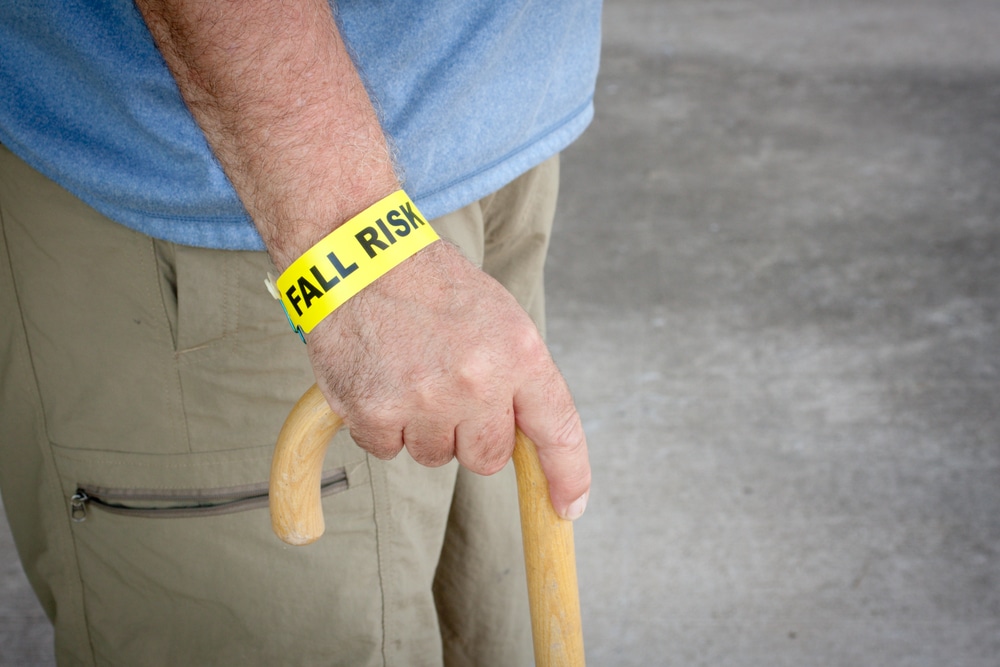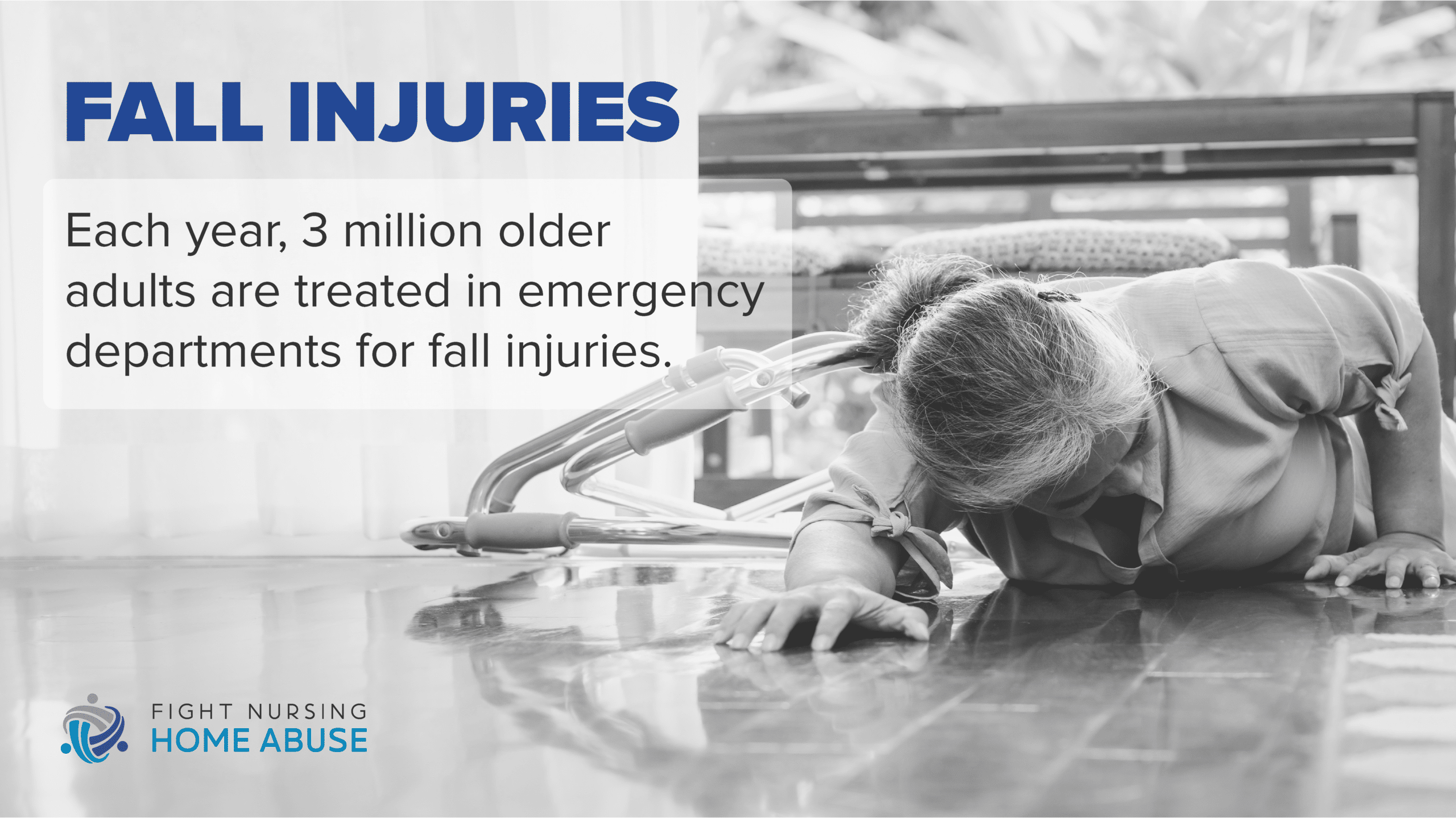Fall Injuries

You entrusted the health, safety, and well-being of your loved one to a nursing home; then you got a phone call saying that they fell and broke a hip. The nursing home rushed your loved one to the hospital by ambulance. They needed surgery to repair the fracture. Your loved one had to undergo a long and painful recuperation.
Even though they followed all the doctor’s orders and completed rehabilitation and physical therapy, they are not as mobile as they were before. Understandably, you have questions about how falls happen in nursing homes. You want to know if there is anything you can do about it if your aging relative sustains a fall injury while in long-term care. Could it be a sign of neglect or abuse?
Common and Usually Preventable
Although it is impossible to prevent 100 percent of falls in nursing homes, many falls happen because of mistakes on the part of the nursing home policies or the staff. Take a look at some statistics on fall injuries that happen in nursing homes:
- The largest single cause of falls among the elderly, at 36 percent, of potentially preventable hospital emergency room visits made by nursing home residents is injury due to a fall.
- Deaths, sometimes even wrongful deaths, of approximately 1,800 nursing home residents each year can be attributed to fall-related injuries.
- A typical, 100-bed nursing home reports at least 100 to 200 falls per year. Keep in mind these are only the reported falls. Several nursing home falls are never reported.
- Adults 65 and older are four times more likely to die of fall-related injuries if they live in a nursing homes compared to those that live at home or with loved ones.
- Up to 75 % of nursing home residents fall on an annual basis. This is more than double the rate for senior citizens who don’t live in nursing homes. Over a third of fall-related injuries happen to residents who can’t walk.
- Although a relatively small number (2 to 6 %) of falls result in fractures, 10 to 20 % of nursing home falls cause extremely serious injuries. Many of these injuries lead to loss of function and disability; the resulting fear of falling can also lead to further loss of function, social isolation, and depression.
- According to the Centers for Disease Control and Prevention (CDC), around 16 to 27% of nursing home falls are a result on environmental hazards.

How Falls Happen in Nursing Homes
Many different things can cause a person in a nursing home to fall and get hurt. Here are a few of the more common things that can lead to a fall:
Medical conditions
Many of the medical issues that plague older people can cause them to fall and get injured. These can include:
- Low or high blood pressure
- Cardiac arrhythmia
- General weakness
- Dizziness
- Balance issues
- Acute illness like the flu or respiratory infection.
Prescription drugs
Quite a few medications can make an older person feel dizzy, weak, or light-headed. Painkillers might make your loved one groggy. Other drugs can affect their balance.
Unfortunately, some nursing homes over-medicate residents to make them easier to manage. You can check your relative’s medical chart to see if the nursing home might have medicated them incorrectly and contributed to their fall.
Transferring
Falls may occur when transferring the patient from bed to wheelchair, toilet chair, walker, or standing and back to bed. Transfers are one of the higher-risk situations for falls in a nursing home. When a staff member assists an older person to get in and out of bed, many things can go wrong, such as:
- The staff member lacks the physical strength to transfer the patient safely.
- The staff member does not have sufficient training and experience in proper transfer techniques.
- The transfer is not done correctly, despite having the training and physical ability to do so.
- The nursing home is understaffed, and a resident who was tired of waiting for help tried to transfer by themselves.
Bathrooms are the sites of many falls. When the resident gets in and out of the shower or bathtub, or on and off of the toilet, they can slip or lose their balance and fall.
Tripping hazards and spills on the floor
If the nursing home does not quickly clean up spills or slick spots on the floor, a resident could easily slip and fall. As we age, our eyesight diminishes, and our reflexes slow down, which can make nursing home residents particularly susceptible to slip and fall injuries. Also, loose rugs on the floor, electrical cords, and raised thresholds present a danger of tripping for nursing home residents.
How a Fall Injury Can Impact a Nursing Home Resident’s Life
A fall can change a senior’s life. Some of the negative consequences of a fall can include:
A fall can rob the person of mobility and independence
A person who was able to walk around on their own might have to use a quad cane, a walker, or a wheelchair to get around. They may also become less active because they are afraid.
A person can fracture a leg, hip, or other bone in a fall
If they try to break their fall, they might break an arm or wrist. If they hit their head on the floor or during the fall, they could sustain a head injury, which could include traumatic brain injury.
A fall can cause the aged person to have to undergo surgery
Surgery exposes the nursing home resident to the risk of potential complications, like surgical infections and blood clots.
Long recuperation and painful physical therapy
Children often bounce back quickly from injuries, but older people heal much more slowly. When a person in a nursing home falls and sustains a severe injury, they will probably have a lengthy recovery time, and it might involve physical therapy.
Less mobility
Less mobility puts the person at higher risk of pneumonia, bed sores, and other health complications. Initially, the patient will be lying in bed more than usual while recuperating from the surgery and injury, so the hospital and nursing home staff need to be extra vigilant to prevent these problems.
Can consign them to a life of chronic pain
An older person might experience ongoing pain long after the wounds have healed as much as they are going to. After a significant fall injury, your loved one might spend the rest of their days hurting.
Ways to Prevent Nursing Home Falls
There are so many precautions that can be taken to prevent fall injuries from happening in the first place. Some of the best ways to prevent nursing home falls include:
- Every resident should have a completed risk assessment which includes past accidents and falls, medications taken, and general physical health.
- Nursing home staff should always be attentive to residents, and the proper equipment should always be available to those who need help walking. These residents should always receive the proper foot care, shoes, and the appropriate walking aids.
- Staff members should be properly trained on fall prevention strategies as well as the risks involved when a resident falls.
- Nursing homes should never have environmental hazards, and if any occur, they should be removed immediately. Environmental hazards consist of poor lighting, slippery floors, debris in walkways, improper exit signs, broken equipment and more.
- Nursing homes should be careful to avoid incorrect bed heights and faulty bed rails. Faulty bed rails and incorrect bed height accounts for close to 30 percent of nursing home falls nationwide.
- Exercise programs, including physical therapy, stretching, and balance should be available to all residents. Although statistics show that exercises may not help with falls, it will help to improve strength and balance which can help lessen injuries should a fall occur.
What to Do If You Suspect That Your Loved One Has Sustained a Fall Injury in a Nursing Home
First, get medical help immediately. Your loved one might have unseen injuries that could lead to internal bleeding. When a nursing home resident falls, they need an immediate medical evaluation.
Second, talk with the nursing home staff to discover how the injury happened so that it does not happen again, to your loved one or someone else.
Third, file a report with the nursing home about the fall injury. Nursing homes must report falls and other injuries, but they do not always comply with this requirement. The licensing and governing authorities need to know which nursing homes are experiencing fall injuries. When a long-term care facility runs up a disproportionate number of these incidents, government agencies can investigate to protect the residents from future harm.
Fourth, talk with a nursing home abuse lawyer about the possibility of pursuing a claim for compensation for your loved one’s medical bills, impaired mobility, and pain and suffering from a fall in a nursing home. Call us today at 1-866-548-9636.


